Matt Moore's Blog, page 14
November 28, 2012
How to Make Character Deaths Hurt
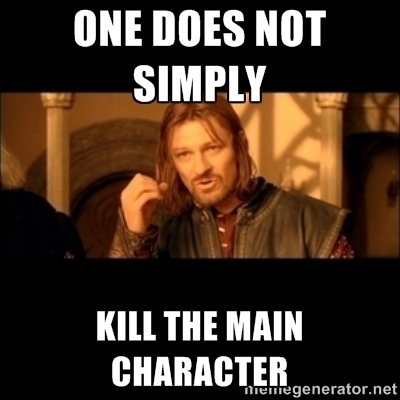
Sure you do.
I recently ran across an outline for an old story I didn’t write. A long piece, it had multiple characters and not all of them lived to the end.
It’s a good thing I didn’t write.
From the outline, it was obvious which characters would die right from the beginning. They had two common characteristics:
They were not point of view characters
They didn’t have character arcs
While their deaths served the needs to the plot, I’m certain they wouldn’t have had an emotional toll on the reader.
Character arcs create connections with a reader
A lot has been written about character arcs. I recommend you go take a look. To keep things short, a character arc is:
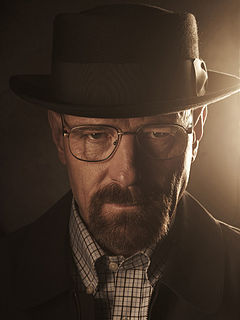
Walter White from Breaking Bad is a character who struggles against the odds. Despite the evil he does, he want him to win.
Introduce a character who has something that she wants but can’t get (or she has something she wants to keep)
This character should also have some kind of flaw
Something beyond her control changes, putting what she wants within reach (or, if she already has it, at risk)
She fights to get what she wants, but her flaw gets in her way… but she can’t see that it’s her flaw that’s holding her back
She struggles, determined, against long odds
There are setbacks and she considers giving up, but she moves on
Finally able to see her flaw for what it is, she overcomes the long odds and succeeds
We cannot help but to root for characters who fight for something, even if we disagree with it. We wish we had the heart to endure setbacks and, even though we know the pain that is coming, set off again to get what we want.
Regular people give up. Heroes struggle on.
So where do meaningful deaths figure in?
This is easy. Take the character arc described above, put success within reach, but the character dies before he can reach it. Making the death a self-sacrifice to save others gets you bonus points.
[image error]
Janet Leigh at Vivian Crane, who began Psycho as the main character, but then got killed quite suddenly. This is just one of many reasons why Psycho works.
For example: the young, cocky solider who alienates everyone else. A girlfriend at home, he’s going to marry her when his tour is over. In combat, he builds trust with the other soldiers and overcomes his brashness. He becomes a sergeant. But with a few days before he goes home, he throws himself on a grenade to save his buddies.
We can tune this up by having him come to realize he never loved his girlfriend and she never loved him; their attraction was superficial. Plus, the soldier has never done anything meaningful with his life. And he could have escaped the grenade, but it would have cost the life of another soldier who has a wife and kids at home.
But readers will see it coming
This pattern has been done so often that we recognize it. How many times have you read a book or watched a movie, heard or read the line like “When I get out of here” and said to youself: Yup, he’s dead. So what can you do to surprise readers?
Short-circuit the character arc. Don’t have the character die at the end, but the middle.
want.
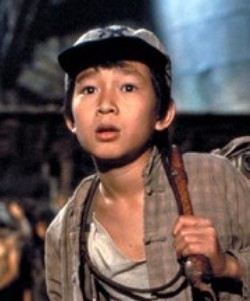
So, what if they killed Short Run halfway through Temple of Doom. How shocking would that have been?
In the example above, the tragedy is the soldier realized and overcame his flaws, but never had the chance to live a better life with this knowledge. Imagine now that when he becomes a sergeant, he has an inkling that he will have to change. He knows as sergeant, the responsibility to survive is on him. But before he can explore that idea, he is killed. The tragedy now is this realization never got to happen. We the audience are programmed to expect that he will change, for the hero to emerge. Violating that expectation will shock readers.
The Walking Dead comic book and Red State do this brilliantly.
Do not take away the set-up elements
Trouble is, it would be easy to take this advice and create one-dimensional characters who become lambs to the slaughter. You must begin characters on their character arc and hint to the audience that it is a character to latch on to. To follow. To invest in. When you violate that trust, you achieve the shock you
The character must also serve an essential element to the plot. For example, let’s take the loyal sidekick who grows to be as confident as the hero, but sacrifices himself in the end so the hero can succeed. Now let’s have this character die before the halfway point, just as he was about to grow in confidence. If this sidekick’s sole purpose is to shock readers with his death, it’s bad writing. The sidekick must be actively pursuing something, doing something, moving things forward.
And then kill them.


November 20, 2012
Cover art for Fear The Abyss
Had to share… THIS!
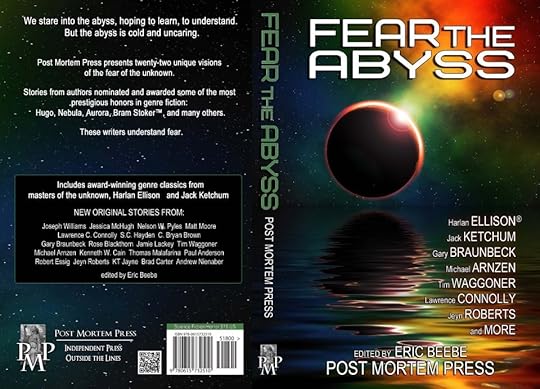
This is the entire cover art for Fear the Abyss, edited by Eric Beebe and coming December from Post Mortem Press. You can pre-order it now from their site for $15.


November 16, 2012
Review: Skyfall

I know it has been out for a week, but I here is a review of Skyfall since I haven’t been able to stop thinking about it. Like Spider-Man 2, Skyfall rises above being a great franchise film into being a great film.
This will be a spoiler-free review, but anything that has been in the trailers is fair game.
Is this a sequel to A Quantum of Solace?
Bond films exist in a loose continuity. No film affects another, with the exception of For Your Eyes Only where Bond (Rogers Moore) lays flowers on his wife’s grave whom he married in On Her Majesty’s Secret Service (when played by George Lazenby). And, of course, A Quantum of Solace is a direct sequel to Casino Royale.
Skyfall is its own film with no references to Quantum or Vespa.
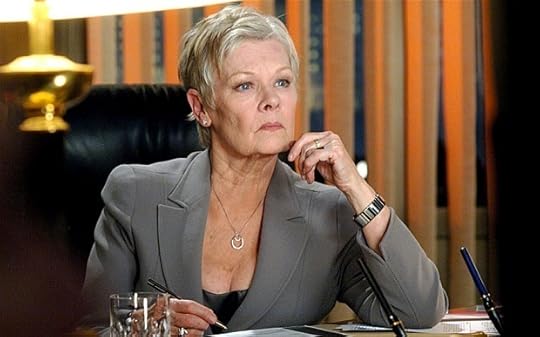
Like a boss! Judi Dench as M, with plenty of screen time playing opposite Craig’s Bond, is one of the great things about this film.
Rather, we revisit themes from Goldeneye where Bond is viewed as a relic—an agent operating in outdated ways. And like The Dark Knight Rises, Bond’s age does come into play as someone who may have lost a step. This idea suggests a lot of time has passed since Casino Royale / A Quantum of Solace where Bond was a newly minted double-0. Or, perhaps this film is its own continuity. Either way, M and Bond have a history of bitter, but mutual, trust. What’s more, we have echoes of The World Is Not Enough where M finds herself under fire from politicians for how she runs MI6. For both her and Bond, the days of dirty deeds done in the shadows are over. They don’t trust her and demand transparency.
It’s themes of trust and history that fuel Skyfall.
So what’s it about and is it any good?
From the trailers we know the basic story: on a mission, Bond is left for dead. Surviving, he indulges his pleasures somewhere that’s not England, but is pulled back when MI6 is attacked. The conflict is caused by something from M’s past, a sin she has not yet atoned for. Not to give anything away, but this sin will wrap around Bond in both plot and theme. It reflects the grudging respect M and Bond have, knowing they understand each other and will do what needs to be done to accomplish the mission, including sacrificing Bond.
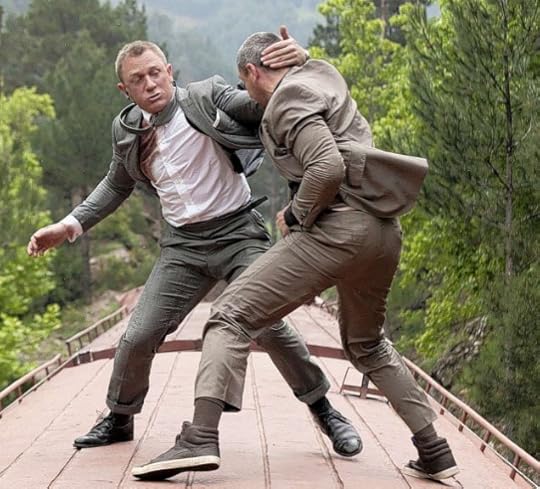
A fight scene on top of a moving train. Too unrealistic for Bourne, but perfect for Bond.
Yet it is Bond’s past that is on display in Skyfall. Not since Lazenby’s turn in a kilt have we acknowledged Bond is Scottish, not English. (And, of course, casting Connery.) We also take on the fact that Bond is an orphan whose parents were killed when he was still young. And M admits she exploited this in recruiting him.
I won’t say who or what Skyfall is, but he/she/it is something or someone in Bond’s past he has not dealt with. He will (almost) literally have to go through Hell to be free from. And when I say “Hell”, watch for how many times characters descend—both physically going lower as well as becoming more primitive—once Skyfall is revealed. How much fire there is. And it’s only Bond that we see physically ascend out of that Hell in a transformative moment of putting Skyfall behind him. Water and religious references also figure into this scene.
Put another way, when Bond finally deals with Skyfall—his past—he is re-born and baptized in water, fire and blood.
And even the name “Skyfall” as a metaphor for the perceived end of the world (“the sky is falling!”) is appropriate.
Craig as Bond
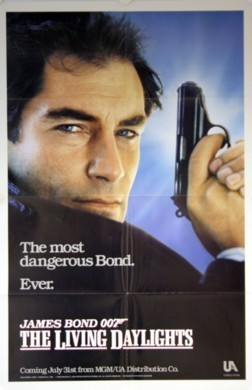
They billed Timothy Dalton as “The most dangerous Bond. Ever.” But a politically correct Bond pales next to Craig’s portrayal of a man with little to lose.
Daniel Craig is great as Bond. Under Sam Mendes’ direction, we have buried the charming and suave (and well-adjusted) Bond. Craig portrays a creature of id, of both pathos and eros, engaging in physical pleasure and danger. It was under M that he found an outlet for this rage. She gave him free reign, knowing his cold brutality could do what others couldn’t. When he is left for dead, Bond tries to put it all behind him, but (unlike Bourne in The Bourne Ultimatum) still must indulge in sex, booze and danger. But it is a meaningless life. When MI6 is attacked, Bond can’t help but come back out of loyalty to M.
In putting his past to rest, Bond emerges at the end of the film fully-formed. Focused, determined, loyal and driven. When Bond reports for his next mission in the last scene, it’s almost a cliffhanger because you want to see him unleashed.
Is this the best Bond film?
This is a great Bond film, with fights, gadgets, the return of Q and an over-the-top villian. Where Casino Royale and A Quantum of Solace showed the influence of the Bourne films’ realism, Skyfall returns to larger-than-life themes, but staying within our post-modern demand for realism. The villain’s lair is the best since Blofeld’s volcano hide-out, grandiose but believable. The fights are just this side of unbelievable, but still brutal. Ralph Fiennes and Judi Dench are superb as kindred souls with opposing goals. And the cinematography is gorgeous.
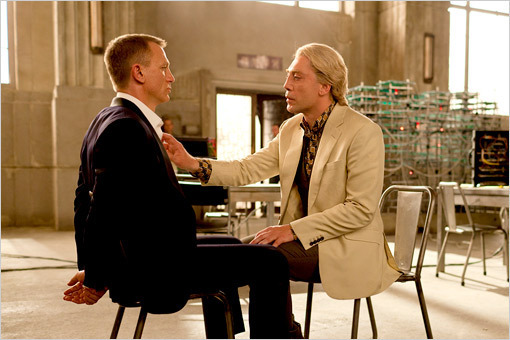
Javier Bardem hacks MI6 and chews through scenery… neither of which did much for me.
Unfortunately, the film is not perfect. The villain’s scheme is straight out 80s and 90s hacker films and just as (im)plausible. Where you could get away with some stuff when computers were still a mystery, today I cringed at lines like “We tried to hack him, but that let him hack us!” or “There’s only 6 people in the world who could have programmed that!” And while Javier Bardem chews the scenery, he reminds me of Jack Nicholson as the Joker—you are aware you are seeing an actor give a performance, not an actor inhabit another person (like Heath Ledger’s turn as the Joker).
Quibbles, though. Skyfall is a fabulous film that has elevated the game.


November 9, 2012
Review: First World War Z Trailer
Is it unfair to compare a movie to the book on which it’s based? Yes, “the book was better”, but I think it is inherent that any derivative work be compared to its source material while understanding they are different media.
World War Z, the novel
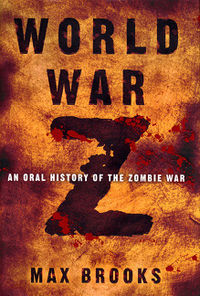
I loved World War Z by Max Brooks. It is an intimate, moving novel. It tackles distrust, greed and self-interest versus the collective good at the individual and international levels. When pressed, Brooks seems to say, the nobility of humankind is stripped away, reducing us to our animal nature. (I believe Kevin Smith’s Red State has the same message.)
The concept of The Great Panic, which ultimately leads to societal collapse, is a fabulous and original idea.
World War Z, the trailer
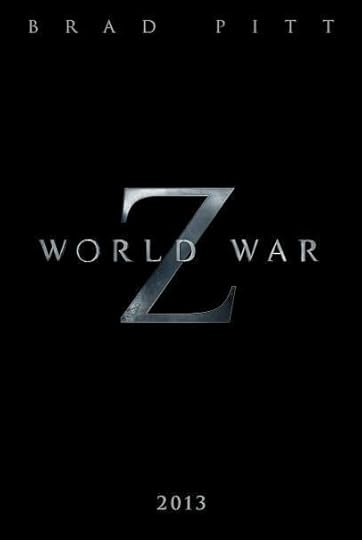 I see none of these qualities in this trailer. In fact, I see none of the ground-breaking and original ideas Brooks brought to his novel.
I see none of these qualities in this trailer. In fact, I see none of the ground-breaking and original ideas Brooks brought to his novel.
First, we have explosions in the distance, an authority figure barking orders and then a mad panic. Seen it: Cloverfield, Dawn of the Dead (2004), I Am Legend.
We also have military hardware flying in to attack the threat. Again, Cloverfield, I Am Legend. I’ll even throw in the Resident Evil films.
Then we have the fast zombies. Seen it: Dawn of the Dead and 28 Days Later. But this last point bears some discussion below.
Finally, we smash cut to exciting scenes… just like every trailer for the last 20 years.
I see none of the intimacy and human storytelling from the book. This looks like another, fast-paced action movie to me. I don’t see horror and I don’t see drama. The first season of The Walking Dead proved these two things can not only go hand-in-hand, but each augments the other when they do.
Oh yeah: Can we stop it with the Inception BWONG already!!!
On fast zombies
In the book, the zombies were slow. This element was important for how humanity regained control of the world. Not to go into spoiler territory, but any Rambo-like soldier with machine guns blazing would not last long. In keeping with the themes of the book, soldiers needed to act together in a calm, rationale way to survive. They lined up shoulder-to-shoulder, firing a single shot one after another. I think there was even a drummer who set the cadence for firing. Breaking ranks meant death.
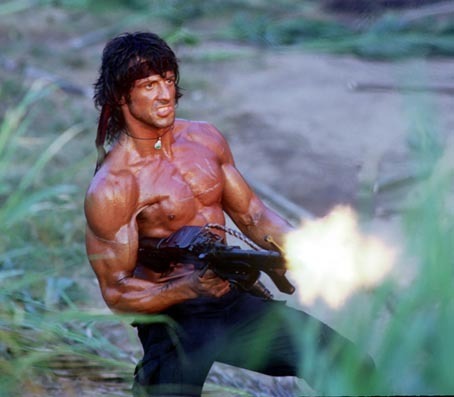
Sorry, John, but against the undead you wouldn’t last long with that thing
In the trailer, soldier rely on automatic weapons, which we all know won’t work. I will say the scene at the 1:18 mark is effective in show the futility of conventional tactics against the undead. But against fast zombies I don’t see how mankind can retake the world as they did in the book. So where is the hope that fuels a good apocalypse story?
Plus, those kinds of scenes can get old fast. The reason the Night on Elm Street and Friday the 13th movies became so silly is each film had to top the creativity of the kills in the previous films. Like junkies, audiences had adapted and needed a more potent hit. If World War Z is one frenetic battle scene after another, audiences will grow tired of it. (Granted, it could be that the scenes in the trailer are taken from the beginning and end.)
Zack Snyder and Danny Boyle used fast zombies the same way Spielberg did with the shark in Jaws and T-Rex in Jurassic Park. Keep them off screen until needed. Snyder kept the tension up by having a single zombie appear now and then, or keeping the zombie horde outside and (temporarily, at least) at bay. A massive (or should I say MASSIVE) zombie horde will be scary the first time, but can’t be sustained throughout a film.
One note, though. At the 2:08 mark, Pitt sells the fear and paranoia with just the shift of his eyes.
In closing, it’s just a trailer
All of that is to say this is just a trailer. It is meant to get people excited. I was about to say “and into the theater” but that’s 7 months away. The next trailer may have a totally different tone than this one and more accurately reflect the film.
Still, the only thing new I see here is a big name actor with serious chops in (and backing) a zombie film. That, at least, gives me some hope.


New Story “The Pack” in AE: The Canadian Science Fiction Review
This week has been so busy I forgot to mention I had a story published in AE: The Canadian Science Fiction Review. “The Pack” is a short (2,000 words) story combining dystopian military themes, horror and science fiction. This is the third story published with AE, the others being “Touch the Sky, They Say” and “Ascension“.
This story began its life at almost twice its current length, but some editing based on great feedback from editor D.F. McCourt cut it down. Then, D.F. made some more precision cuts to get it to its current length.
I won’t say too much about the story except that it has always been a zombie story in my mind. There is not a zombie to be seen, but when reading it keep that idea in mind. The themes of transformation, loss of identity and infection.
Check out the cover art below. I love this since it’s a scene that does not appear in the story, but is hinted it. The power and rage of this character is perfectly captured.
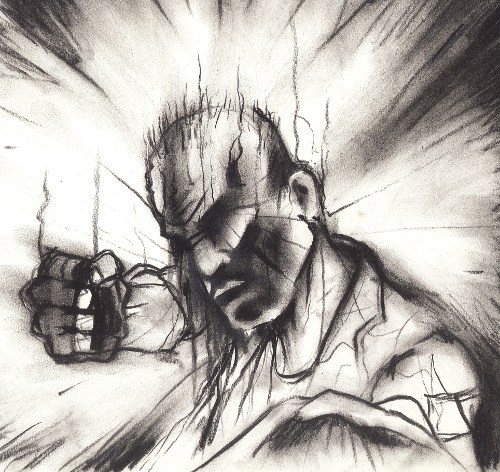
Cover art from “The Pack”. (Wish I could give credit to the artist.)


November 8, 2012
SFContario 2012 Schedule
[image error]Below is my schedule for SFContario coming up this weekend. If you don’t know, SFContario is an annual convention held in Toronto focusing on the literary side of science fiction.
Two things I’ll point out is a Kaffeeklatsch at 1PM on Saturday. This will be my first kaffeeklatsch, so please come on out and say hi.
I will be reading my Aurora-eligible story “Delta Pi” on Sunday at 1PM. “Delta Pi” first appeared in Torn Realities from Post Mortem Press.
Friday
10PM: Flash Fiction After Dark (Ballroom BC) – Had great discussions on this at Ad Astra and Can*Con. This will be great.
Saturday
11AM: Others Among Us (Courtyard) – Is SF finally cool?
1PM: Kaffeeklatsch (Room 207)
4PM: Aaaaaas You Wishhhhhh (Solarium) – Try to stump the panel with movie quotes.
7PM: Why Zombies? Why Now? (Gardenview) – It’s about puppies and bunnies… that want to eat your flesh.
Sunday
 1PM: Reading (Gardenview) – “Delta Pi” from Torn Realities
1PM: Reading (Gardenview) – “Delta Pi” from Torn Realities
2PM: The Future of Privacy (Courtyard) – Is it a right? Or an outdated concept?
Descriptions of the panels can be found on the SFContario Panels page.


World Fantasy Convention 2012 Wrap-Up
So, here is my obligatory post-WFC 2012 review.
First, Peter Halasz, who chaired the convention, pulled off a master piece. I am not a major fantasy fan, but I found the panels intriguing and educational. My head is still spinning with ideas.
To say nothing of the con-suite. Con-suites have been hit or miss; some well-run, others confusing jumbles of empty coolers and a tray of day-old veggies. This con-suite was always packed with fresh food, cold drinks and free cocktails. It was certainly the place to be.
Except for Saturday night, when ChiZine Publications brought the house down. Starting promptly at 9 when we opened the door and accepted the flood of party-goers into the Vice Presidential Suite. I have never been to a party so positive, so packed, so energized since university. I went to bed at 4AM and the party was still in full swing.
I know a lot has been written already and I won’t go into too many details. Just to say thanks and it was great to see so many friends again and make some new ones!


October 23, 2012
Schedule for World Fantasy Convention 2012
I’ve received my schedule for the World Fantasy Convention coming up next weekend in Toronto and it’s light.
Thursday, November 1
3:00 p.m.
Vaughan East
“The Wilderness Within”
Eileen Gunn (M), John Clute, Nathan Crowder, Lois Gresh
Yup, that’s it. But, I am grateful to be on a panel given the amazing talent coming to Toronto.
I’ve also gotten a peak at my schedule for SFContario, which will be a bit more robust. More on that when it is finalized.
Hope to see you all in Toronto!


October 22, 2012
New Short Fiction Sale to Post Mortem Press
I’m thrilled to announce my near-future science fiction/horror story “That Which Does Not Kill You” has been purchased for Fear the Abyss, a new anthology from Post Mortem Press. It will appear alongside works by Harlan Ellison and Jack Ketchum.
Earlier this year, they published “Delta Pi” in the Lovecraft-inspired Torn Realities.
Many thanks to Editor Eric Beebe who gave this story its chance.
I’ll post more details as I get them.


New Short Fiction Sales to Post Mortem Press
I’m thrilled to announce my near-future science fiction/horror story “That Which Does Not Kill You” has been purchased for Fear the Abyss, a new anthology from Post Mortem Press. It will appear alongside works by Harlan Ellison and Jack Ketchum.
Earlier this year, they published “Delta Pi” in the Lovecraft-inspired Torn Realities.
Many thanks to Editor Eric Beebe who gave this story its chance.
I’ll post more details as I get them.





